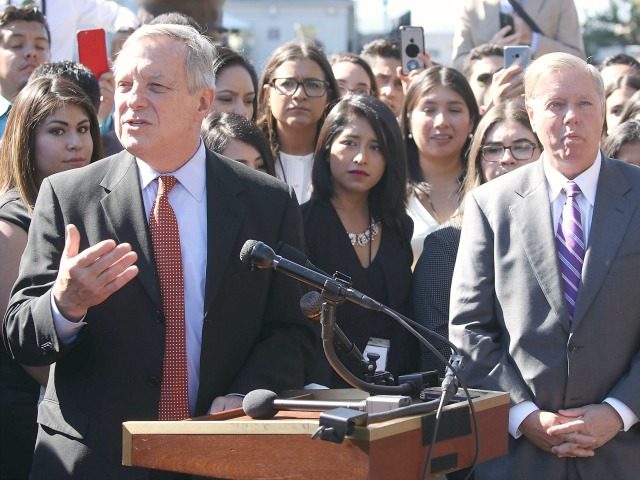A group of four business-first GOP Senators is meeting with Democrats to negotiate an amnesty for illegals which would trash President Donald Trump’s pro-American immigration principles.
According to CNN:
Illinois Sen. Dick Durbin, the No. 2 Democrat, hosted a meeting of the Senate negotiators on Thursday afternoon, including Republicans Lindsey Graham, James Lankford, Cory Gardner, Jeff Flake and staff from Sen. Thom Tillis. But all exiting the meeting said while negotiations progressed, no break-throughs have been reached yet. And while some wouldn’t rule it out as a possibility, none expressed much optimism it could be done by the end of the year.
“It’s starting to take form, but we’re still negotiating,” Durbin said …“What we’re trying to do is figure out where we have common ground there,” Tillis said. “But we’ll be reaching a point pretty soon to where we have to have a discussion about chain migration, which is very important, the President’s told us, and border security and other things. I would say when we talk about ‘we’re close to an agreement,’ we’re only talking about one half of the broader agreement, so maybe we’re a third of the way there.”
The CNN article also notes that Democratic legislators are admitting that they are not going to get the GOP’s agreement to extended the DACA amnesty for 690,000 illegals, or pass the DREAM Act for 3 million illegals.
Lankford is working with Tillis to promote their SUCCEED Act and has welcomed illegal immigrants as a benefit for companies.
Colorado GOP Sen. Gardner is trying to keep a low profile in the amnesty talks.
Flake and Graham were part of the disastrous 2013 “Gang of Eight” amnesty plan, with Durbin.
Alaska GOP Sen. Lisa Murkowski is expected to work with Durbin on an amnesty, amid calls from home-state employers for a greater supply of workers.
GOP Sen. Lisa Murkowski wants 'dreamer' amnesty of 3m migrants for Christmas b/c two Mexican migrants 'adopt' themselves into Alaska. So Americans cannot enforce their immigration rules against a world of migrants if Alaska's chamber wants cheaper labor? https://t.co/Ad7MP2qvGA
— Neil Munro (@NeilMunroDC) December 12, 2017
The rival GOP immigration proposal — dubbed the SECURE Act — is being led by Sen. Chuck Grassley, in cooperation with Texas Sen. John Cornyn and Majority Lader Sen. Mitch McConnell. The GOP proposal includes some of President Trump’s immigration priorities.
An early draft of the SECURE Act would raise Americans’ wages by ending chain-migration and the visa lottery.
Senate GOP group introduces new pro-American immigration reform bill, fixing chain migration & much else in exchange for 3-yr work permits to younger illegals. But group member Sen. Tillis quickly offers amnesty w/citizenship for 2m illegals. https://t.co/jXsML3tQbS #DreamActNow
— Neil Munro (@NeilMunroDC) December 5, 2017
However, some of the Senators in Grassley’s group want to change their draft proposal, for example, by delaying the end of chain-migration.
The SECURE Act also does not mandate all companies use the E-Verify system to verify that prospective hires are not illegals. That omission gives tacit approval for many companies to continue hiring wage-lowering illegal immigrants.
Legislators may try to combine the proposals in January or February.
House leaders have given little indication about how they will deal with the immigration issue in January and February.
Many polls show that the Democrats’ calls for amnesty are unpopular because they contradict Americans’ sense of fairness to other Americans.
Business groups and Democrats embrace the misleading, industry-funded “nation of immigrants” polls which pressure Americans to say they welcome migrants. The alternative “fairness” polls show that voters put a much higher priority on helping their families, neighbors, and fellow nationals get decent jobs in a high-tech, high-immigration, low-wage economy.
The political power of the voters’ fairness priorities was made clear during the GOP primaries and again in November 2016. This year, groups such as FAIR and Americans for Legal Immigration PAC have deterred many business-first GOP politicians from openly supporting an amnesty.
Multiple polls show the public is strongly opposed to the Democrats’ threat to shut down the government if they do not get their DREAM Act amnesty by Christmas for 3 million illegals.
Four million Americans turn 18 each year and begin looking for good jobs in the free market.
But the federal government inflates the supply of new labor by annually accepting 1 million new legal immigrants, by providing work-permits to roughly 3 million resident foreigners, and by doing little to block the employment of roughly 8 million illegal immigrants.
The Washington-imposed economic policy of mass-immigration floods the market with foreign labor, spikes profits and Wall Street values by cutting salaries for manual and skilled labor offered by blue-collar and white-collar employees. It also drives up real estate prices, widens wealth-gaps, reduces high-tech investment, increases state and local tax burdens, hurts kids’ schools and college education, pushes Americans away from high-tech careers, and sidelines at least 5 million marginalized Americans and their families, including many who are now struggling with opioid addictions.
The cheap-labor policy has also reduced investment and job creation in many interior states because the coastal cities have a surplus of imported labor. For example, almost 27 percent of zip codes in Missouri had fewer jobs or businesses in 2015 than in 2000, according to a new report by the Economic Innovation Group. In Kansas, almost 29 percent of zip codes had fewer jobs and businesses in 2015 compared to 2000, which was a two-decade period of massive cheap-labor immigration.
Because of the successful cheap-labor strategy, wages for men have remained flat since 1973, and a large percentage of the nation’s annual income has shifted to investors and away from employees.

COMMENTS
Please let us know if you're having issues with commenting.